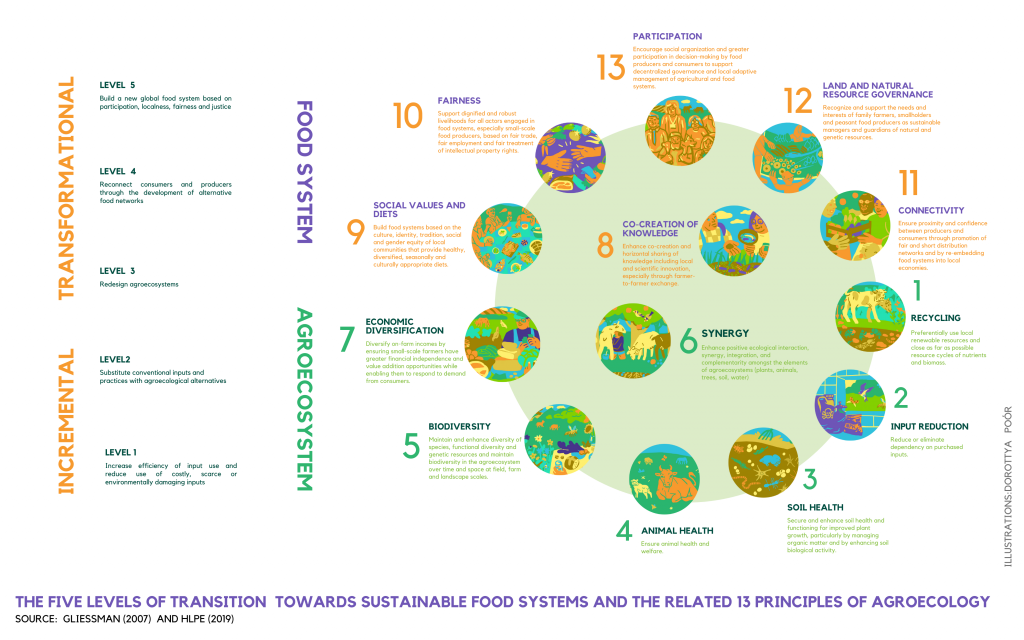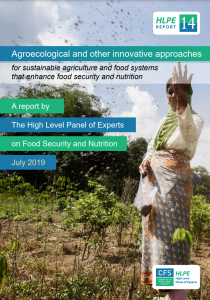DEFINITION OF AGROECOLOGY IN UNITED NATIONS DOCUMENTS
Consolidated set of 13 agroecological principles (HLPE 2019)
- Recycling. Preferentially use local renewable resources and close as far as possible resource cycles of nutrients and biomass.
- Input reduction. Reduce or eliminate dependency on purchased inputs.
- Soil heath. Secure and enhance soil health and functioning for improved plant growth, particularly by managing organic matter and by enhancing soil biological activity.
- Animal health. Ensure animal health and welfare.
- Biodiversity. Maintain and enhance diversity of species, functional diversity and genetic resources and maintain biodiversity in the agroecosystem over time and space at field, farm and landscape scales.
- Synergy. Enhance positive ecological interaction, synergy, integration, and complementarity amongst the elements of agroecosystems (plants, animals, trees, soil, water).
- Economic diversification. Diversify on-farm incomes by ensuring small-scale farmers have greater financial independence and value addition opportunities while enabling them to respond to demand from consumers.
- Co-creation of knowledge. Enhance co-creation and horizontal sharing of knowledge including local and scientific innovation, especially through farmer-to-farmer exchange.
- Social values and diets. Build food systems based on the culture, identity, tradition, social and gender equity of local communities that provide healthy, diversified, seasonally and culturally appropriate diets.
- Fairness. Support dignified and robust livelihoods for all actors engaged in food systems, especially small-scale food producers, based on fair trade, fair employment and fair
treatment of intellectual property rights. - Connectivity. Ensure proximity and confidence between producers and consumers through promotion of fair and short distribution networks and by re-embedding food systems into local economies.
- Land and natural resource governance. Recognize and support the needs and interests of family farmers, smallholders and peasant food producers as sustainable managers and guardians of natural and genetic resources.
- Participation. Encourage social organization and greater participation in decision-making by food producers and consumers to support decentralized governance and local
adaptive management of agricultural and food systems.
THE 10 ELEMENTS OF AGROECOLOGY
Sources : FAO Knowledge Hub – http://www.fao.org/agroecology/knowledge/10-elements/en/
In guiding countries to transform their food and agricultural systems, to mainstream sustainable agriculture on a large scale, and to achieve Zero Hunger and multiple other SDGs, the following 10 Elements emanated from the FAO regional seminars on agroecology.
The 10 Elements of Agroecology are interlinked and interdependent.
As an analytical tool, the 10 Elements can help countries to operationalise agroecology. By identifying important properties of agroecological systems and approaches, as well as key considerations in developing an enabling environment for agroecology, the 10 Elements are a guide for policymakers, practitioners and stakeholders in planning, managing and evaluating agroecological transitions.

Diversity : diversification is key to agroecological transitions to ensure food security and nutrition while conserving, protecting and enhancing natural resources […]

Co-creation and sharing of knowledge: agricultural innovations respond better to local challenges when they are co-created through participatory processes […]

Synergies : building synergies enhances key functions across food systems, supporting production and multiple ecosystem services […]

Efficiency :innovative agroecological practices produce more using less external resources […]

Recycling : more recycling means agricultural production with lower economic and environmental costs […]

Resilience : enhanced resilience of people, communities and ecosystems is key to sustainable food and agricultural systems […]

Human and social values: protecting and improving rural livelihoods, equity and social well-being is essential for sustainable food and agricultural systems […]

Culture and food traditions : by supporting healthy, diversified and culturally appropriate diets, agroecology contributes to food security and nutrition while maintaining the health of ecosystems […]

Responsible governance : sustainable food and agriculture requires responsible and effective governance mechanisms at different scales – from local to national to global […]

Circular and solidarity economy : circular and solidarity economies that reconnect producers and consumers provide innovative solutions for living within our planetary boundaries while ensuring the social foundation for inclusive and sustainable development […]


